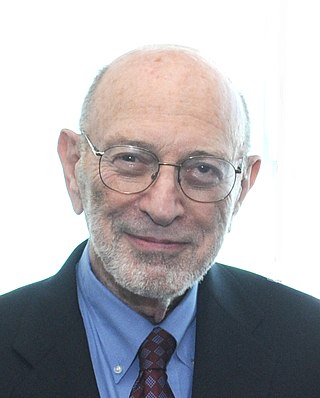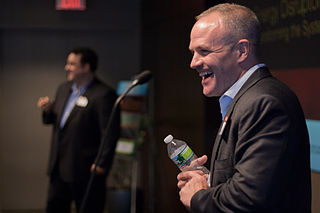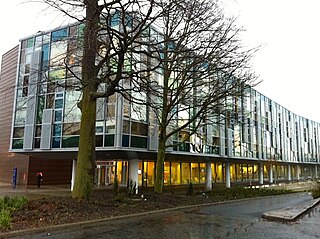Sources
- Profile, Center for Genetics and Society.
Richard Hayes is visiting scholar at the University of California at Berkeley College of Natural Resources / Energy and Resources Group. He was founding executive director of the Berkeley, California-based Center for Genetics and Society, serving from 1999 through 2012. In the early 1990s he chaired the Sierra Club's Global Warming Campaign Committee. In the 1980s he served on the national staff of the Sierra Club, first as assistant political director and then as national director of volunteer development. He was previously executive director of the San Francisco Democratic Party.
According to Bill McKibben in 2004's Enough: Staying Human in an Engineered Age, Hayes is "one of the leading crusaders against germline manipulation," that is, the modification of inheritable human genetic traits. [1] Hayes has briefed United Nations delegates on the need for a global ban on human cloning, and has testified in support of international oversight of human biotechnologies, and against the cloning of pets. [2] He is quoted in a 2002 article in Newsweek International declaiming the "vacuum of leadership," regarding responsible oversight of human genetic technology, noting that "[t]hese technologies ... have developed so rapidly that there is not the type of structure to regulate them". [3] He holds a PhD from Energy and Resources from the University of California at Berkeley.

Biotechnology is a multidisciplinary field that involves the integration of natural sciences and engineering sciences in order to achieve the application of organisms, cells, parts thereof and molecular analogues for products and services.

Genetic engineering, also called genetic modification or genetic manipulation, is the modification and manipulation of an organism's genes using technology. It is a set of technologies used to change the genetic makeup of cells, including the transfer of genes within and across species boundaries to produce improved or novel organisms. New DNA is obtained by either isolating and copying the genetic material of interest using recombinant DNA methods or by artificially synthesising the DNA. A construct is usually created and used to insert this DNA into the host organism. The first recombinant DNA molecule was made by Paul Berg in 1972 by combining DNA from the monkey virus SV40 with the lambda virus. As well as inserting genes, the process can be used to remove, or "knock out", genes. The new DNA can be inserted randomly, or targeted to a specific part of the genome.

Transhumanism is a philosophical and intellectual movement which advocates the enhancement of the human condition by developing and making widely available sophisticated technologies that can greatly enhance longevity and cognition.

Stanley Norman Cohen is an American geneticist and the Kwoh-Ting Li Professor in the Stanford University School of Medicine. Stanley Cohen and Herbert Boyer were the first scientists to transplant genes from one living organism to another, a fundamental discovery for genetical engineering. Thousands of products have been developed on the basis of their work, including human growth hormone and hepatitis B vaccine. According to immunologist Hugh McDevitt, "Cohen's DNA cloning technology has helped biologists in virtually every field". Without it, "the face of biomedicine and biotechnology would look totally different." Boyer cofounded Genentech in 1976 based on their work together, but Cohen was a consultant for Cetus Corporation and declined to join. In 2022, Cohen was found guilty of having committed fraud in misleading investors into a biotechnology company he founded in 2016, and paid $29 million in damages.

The National Human Genome Research Institute (NHGRI) is an institute of the National Institutes of Health, located in Bethesda, Maryland.
The Council for Responsible Genetics (CRG) was a nonprofit NGO with a focus on biotechnology.
Gregory Stock is an American biophysicist, best-selling author, biotech entrepreneur, and the former director of the Program on Medicine, Technology and Society at UCLA’s School of Medicine. His interests lie in the scientific and evolutionary as well as ethical, social and political implications of today's revolutions in the life sciences and in information technology and computers.
The Center for Genetics and Society (CGS) is a non-profit information and public affairs organization, based in Berkeley, California, United States. It encourages responsible use and regulation of new human genetic and reproductive technologies.

Jay D. Keasling is a professor of chemical engineering and bioengineering at the University of California, Berkeley. He is also associate laboratory director for biosciences at the Lawrence Berkeley National Laboratory and chief executive officer of the Joint BioEnergy Institute. He is considered one of the foremost authorities in synthetic biology, especially in the field of metabolic engineering.

The President's Council of Advisors on Science and Technology (PCAST) is a council, chartered in each administration with a broad mandate to advise the president of the United States on science and technology. The current PCAST was established by Executive Order 13226 on September 30, 2001, by George W. Bush, was re-chartered by Barack Obama's April 21, 2010, Executive Order 13539, by Donald Trump's October 22, 2019, Executive Order 13895, and by Joe Biden's February 1, 2021, Executive Order 14007.
Following is a list of topics related to life extension:

Biotechnology is the application of scientific and engineering principles to the processing of materials by biological agents to provide goods and services. From its inception, biotechnology has maintained a close relationship with society. Although now most often associated with the development of drugs, historically biotechnology has been principally associated with food, addressing such issues as malnutrition and famine. The history of biotechnology begins with zymotechnology, which commenced with a focus on brewing techniques for beer. By World War I, however, zymotechnology would expand to tackle larger industrial issues, and the potential of industrial fermentation gave rise to biotechnology. However, both the single-cell protein and gasohol projects failed to progress due to varying issues including public resistance, a changing economic scene, and shifts in political power.
In bioethics, the ethics of cloning refers to a variety of ethical positions regarding the practice and possibilities of cloning, especially human cloning. While many of these views are religious in origin, some of the questions raised by cloning are faced by secular perspectives as well. Perspectives on human cloning are theoretical, as human therapeutic and reproductive cloning are not commercially used; animals are currently cloned in laboratories and in livestock production.

Joachim Wilhelm "Jo" Messing was a German-American biologist who was a professor of molecular biology and the fourth director of the Waksman Institute of Microbiology at Rutgers University.
Jeremy Gruber is a lawyer, writer, and public policy advocate and is the senior vice president at Open Primaries. He is the former President and Executive Director of the Council for Responsible Genetics. He has testified before the United States Congress on genetic privacy and discrimination issues. He was a leader of the successful effort to enact the Genetic Information Nondiscrimination Act as well as a number of state laws that preceded it and led the successful campaign to roll back a controversial student genetic testing program at the University of California, Berkeley. In 2011, Gruber led an effort to successfully enact CalGINA-a California law that extends genetic privacy and nondiscrimination protections into areas such as life, long term care, and disability insurance, mortgages, elections and other areas.

Richard M. Myers is an American geneticist and biochemist known for his work on the Human Genome Project (HGP). The National Human Genome Research Institute says the HGP “[gave] the world a resource of detailed information about the structure, organization and function of the complete set of human genes.” Myers' genome center, in collaboration with the Joint Genome Institute, contributed more than 10 percent of the data in the project.

The Roslin Institute is an animal sciences research institute at Easter Bush, Midlothian, Scotland, part of the University of Edinburgh, and is funded by the Biotechnology and Biological Sciences Research Council.
Christopher Roland Somerville is a Canadian-American biologist known as a pioneer of Arabidopsis thaliana research. Somerville is currently Professor Emeritus at the University of California, Berkeley and a Program Officer at the Open Philanthropy Project.

Aspects of genetics including mutation, hybridisation, cloning, genetic engineering, and eugenics have appeared in fiction since the 19th century.
Grahame Bulfield, CBE, FRSE, Hon FRASE is an English geneticist, vice-principal and Emeritus Professor of Genetics at the University of Edinburgh. He is best known as the former director and chief executive of the Roslin Institute, Edinburgh, when in 1996 the research group led by Ian Wilmut first cloned a mammal from an adult somatic cell, a Finnish Dorset lamb named Dolly.